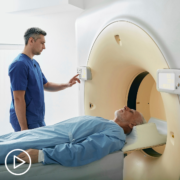When Should Follicular Lymphoma Treatment Begin?
When Should Follicular Lymphoma Treatment Begin? from Patient Empowerment Network on Vimeo.
When might treatment begin for follicular lymphoma patients? Expert Dr. Kami Maddocks from The Ohio State University Comprehensive Cancer Center explains factors that are weighed in treatment decisions and situations when treatment might begin.
See More from START HERE Follicular Lymphoma
Related Resources:

What’s New for Follicular Lymphoma Treatment News and Developments? |

|

|
Transcript:
Lisa Hatfield:
So you probably have a number of patients who are in the watch-and-wait mode right now. When do you decide when you use these particular therapies? And if you use them earlier on, is there any chance of managing the follicular lymphoma longer or a longer remission?
Dr. Kami Maddocks:
That’s a great question. So from what we know from follicular lymphoma, it’s, as I mentioned, an indolent lymphoma, not curable, but very treatable. So many patients that are diagnosed with follicular lymphoma, the median overall survival is very long, and it’s more, again, like a chronic disease that we manage with treatment. So sometimes we recommend watch and wait because patients, there’s never been any study showing that early treatment with the therapies we had improved overall survival. So it’s a balance between deciding when patients have a need for treatment versus not exposing them to treatment that can cause toxicities, if we know that it ultimately doesn’t make them live longer.
But, of course, we want to both treat patients who need disease treatment either for symptoms or for things that are going on by the size of their lymph nodes. So when patients have low blood counts, when they have symptomatic lymph nodes, when they have lymph nodes that are potentially causing a problem to an organ, or we foresee that it could cause a problem to an organ, when they have certain burdens of disease or when they have enough and large lymph nodes that we think that there’s going to be a problem in the near future without treating is when we decide to initiate that treatment.
Share Your Feedback:
Create your own user feedback survey



